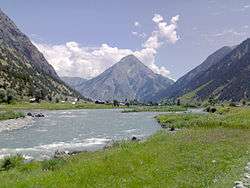Habba Khatoon
Habba Khatoon (or Khatun), also known as Zoon and Nightingale of Kashmir (1554–1609), was an eminent Kashmiri Muslim poet and ascetic. She was the wife of Yusuf Shah Chak, the last ruler of Kashmir.

Biography
She was born in a small village in Pampore, Pulwama in the Jammu and Kashmir state. Her real name was Zoon, Zon or Zun (the Moon), a common Kashmiri first name.[1] According to the oral tradition, she was called Zoon because of her great beauty. Although a peasant, she learnt how to read and write from the village moulvi. At an early age her father married her to a peasant boy but this first marriage proved difficult, and apparently ended in divorce.
According to legend, one day Yusuf Shah Chak was out hunting on horseback. He heard Zoon singing under the shade of a chinar tree, and the couple met and fell in love. The oral tradition describes Zoon as Yusuf Shah's queen consort, although there is scholarly debate about whether she was in fact a lower status mistress or member of his harem.[2] She entered the palace in about 1570, and at some point changed her name to become Habba Khatoon.
The couple were reportedly very content, and Yusuf Shah became the ruler of Kashmir. However, they were separated in 1579 after the Mughal emperor Akbar had Yusuf Shah arrested and imprisoned in Bihar, never to return. After this, Habba Khatoon became an ascetic,[3][4] and spent the rest of her life wandering across the Valley singing her songs.
Habba Khatun composed songs in the Kashmiri language. It is claimed that she introduced "loal" to Kashmiri poetry, "Loal" is more or less equivalent to the English 'lyric'. It conveys one brief thought. Braj Kachru states that Habba Khatun and Arnimal "perfected the loal form of Kashmiri poetry".[1]
There is some dispute about the historical accuracy of Habba Khatun's biography, however the songs associated with her (including Mye ha kaer chey kit and Che Kamiu Sonei Myani) are widely popular across Kashmir. Her songs are frequently mournful and full of the sorrow of separation. Her tomb lies near Athwajan (English connotation: Handful of Rings) on the Jammu-Srinagar national highway.[3]
She has a profound presence in the oral tradition and is hailed as the last independent poet queen of Kashmir.
Honours
An underpass in Mughalpura, Lahore has been named after Habba Khatoon.
Indian Coast Guard has also named a ship as CGS Habba Khatoon after her name
See also
- Arnimal
- Lal Ded
References
- Kachru, Braj Behari (1981). Kashmiri literature. Harrassowitz. ISBN 3447021292. OCLC 1014524295.
- Sadhu, S. L. Haba Khatoon. ISBN 9788126019540. OCLC 1007839629.
- "A grave mistake". The Tribune. 3 June 2000. Retrieved 10 March 2013.
- Kalla, p. 201
- Krishan Lal Kalla (1985). "19. Nightingale of Kashmr". The Literary Heritage of Kashmir. Mittal Publications.
- Habba Khatoon (1554–1609), Biography
- Kashmiri poets: Habba Khatoon
Further reading
- Wakhlu, S. N. (1994). Habba Khatoon: the nightingale of Kashmir. South Asia Publications. ISBN 8174330054.